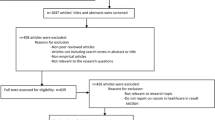Abstract
This paper involves a case study of physicians working in an urban Midwestern region. It raises questions surrounding how physicians adapted to, encouraged and resisted the increasing presence of managed care in their work lives. The patterning of physician accommodation to managed care and the failure of physicians to mount any effective organized resistance in Metro has some important implications for theories about professional dominance and decline.
Similar content being viewed by others
REFERENCES
Budrys, G. (1993). Coping with change: Physicians in prepaid practice.Sociology of Health and Illness, 15, 353–374.
Freidson, E. (1985). The changing nature of the medical profession.Medical Care Review, 42, 11–35.
Freidson, E. (1989).Medical work in America: Essays on health care. New Haven, Conn: Yale University Press.
Hafferty, F. and Wolinksy, F. (1991). Conflicting characterizations of professional dominance. In J. Levy (Ed.),Current research on occupations and professions (pp. 225–249). Greenwich, CT: JAI Press.
Hafferty, F. and Light, D. (1995). Professional dynamics and the changing nature of medical work.Journal of Health and Social Behavior (extra issue), 132–153.
Haug, M. (1988). A reexamination of the hypothesis of physician deprofessionalization.Milbank Quarterly, 66, 28–56.
Light, D. (1991). Commentary: Professionalism as a countervailing power.Journal of Health Politics, Policy and Law, 16, 499–506.
Luft, H.S. (1987).Health maintenance organizations: Dimensions of performance. New York: John Wiley and Sons.
McKinley, J.B. and Arches, J. (1985). Towards the proletarianization of physicians.International Journal of Health Services, 15, 161–195.
Mechanic, D. (1991). Sources of countervailing power in medicine.Journal of Health Politics Policy and Law, 16, 485–498.
Montgomery, K. (1992). A prospective look at the specialty of medical management.Work and occupations, 17, 178–198.
Relman, A.S. (1991). Shattuck lecture — The health care industry: Where is it taking us?New England Journal of Medicine, 325, 854–859.
Schulz, R., Scheckler, W., Girard, C., and Barker, K. (1990). Physician adaptation to health maintenance organizations and implications for management.Health Services Research, 25, 43–64.
Starr, P. (1982).The social transformation of American medicine. New York: Basic Books.
Stearns, C.A. (1991). Physicians in restraints: HMO gatekeepers and their perceptions of demanding patients.Qualitative Health Research, 1, 326–348.
Wholey, D. R., Christianson, J.B., and Sanchez, S.M. (1993). The effect of physician and corporate interests on the formation of health maintenance organizations.American Journal of Sociology, 99, 164–200.
Author information
Authors and Affiliations
Rights and permissions
About this article
Cite this article
Stearns, C.A. How Physicians Lost Out to Managed Care: A Case Study of Accommodation and Resistance in a Medical Community. Journal of Medical Humanities 18, 261–271 (1997). https://doi.org/10.1023/A:1025650105014
Issue Date:
DOI: https://doi.org/10.1023/A:1025650105014




